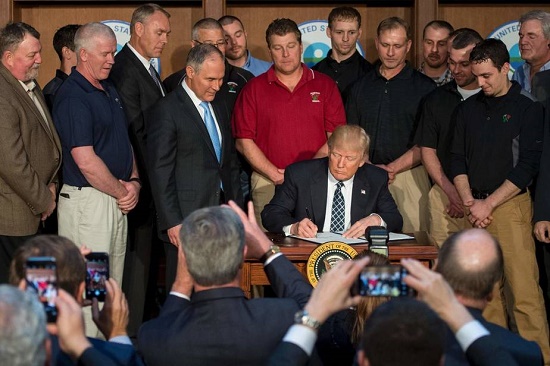
Story of the Week... Toon of the Week... El Niño/ La Niña Update... Quote of the Week... Graphic of the Week... SkS in the News... Photo of the Week... SkS Spotlights... Video of the Week... Report of Note... Coming Soon on SkS... Poster of the Week... Climate Feedback Reviews... SkS Week in Review... 97 Hours of Consensus...
Trump's Executive Order: More Fossil Fuels, Regardless of Climate Change

President Donald Trump, surrounded by coal miners, signs his administration's executive order on energy that aims to unleash fossil fuel development by undoing the Obama administration's climate change policies. Credit: JIM WATSON/AFP/Getty Images
President Donald Trump signed an executive order on Tuesday calling on every federal agency to loosen the regulatory reins on fossil fuel industries, the most significant declaration of the administration's intent to retreat from action on climate change.
Trump directed all departments to identify and target for elimination any rules that restrict U.S. production of energy, and he set guidance to make it more difficult to put future regulations in place on the coal, oil and natural gas industries.
The White House sought to frame the Executive Order on Promoting Energy Independence and Economic Growth as an "all-of-the-above" energy policy. "We're looking at deposits of coal, looking at nuclear, looking at renewables, all of it," said a senior administration official in a briefing. But the primary aim is clearly to unleash fossil fuel development by undoing the policies that President Barack Obama put in place to curb the nation's carbon emissions.
Trump's executive order steered clear of whether the U.S. will remain a party to the Paris climate agreement. The White House has not yet made a decision, the official said. But gutting climate policies as the executive order seeks to do would make the U.S. obligations under the treaty virtually impossible to meet. It would also put in jeopardy the landmark agreement's goal of keeping the global temperature increase below 2 degrees Celsius.
Trump's Executive Order: More Fossil Fuels, Regardless of Climate Change by Marianne Lavelle, InsideClimate News, Mar 28, 2017
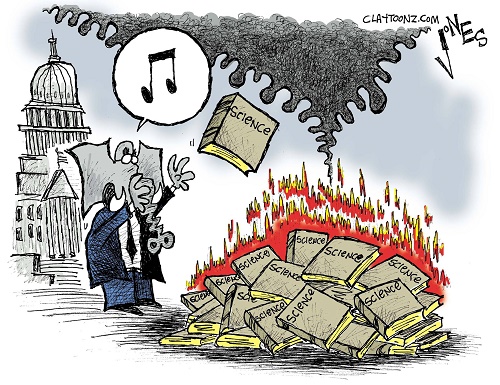
By trying to turn back the policy clock, Trump’s denying the latest scientific and economic research, not bringing it to bear. “In no sense does that reflect an effort to draw on an understanding of the latest science, economics, and the law,” says Michael Greenstone, a University of Chicago economist.
Trump Thinks the “Best Available” Data on Climate Change Is From 2003 by Ramin Skibba, Slate, Mar 29, 2017
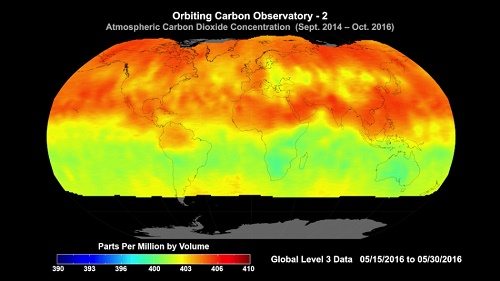
Carbon dioxide concentrations across the globe as measured by the Orbiting Carbon Observatory-2 in May 2016. (Credit: NASA)
‘Critical’NASA Climate Missions Targeted in Budget Cuts by Andrea Thompson, Climate Central, Mar 31, 2017
[To be added.]
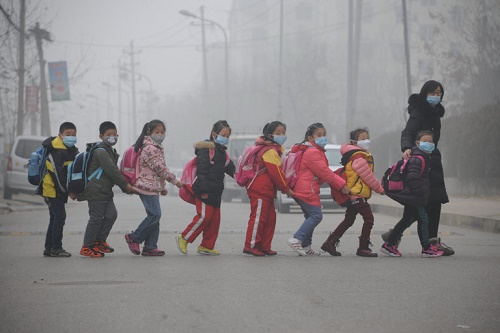
Students wearing masks amid heavy air pollution in Jinan, China.CreditSTR/Agence France-Presse — Getty Images
Women’s Crucial Role in Combating Climate Change by Alina Tugend, New York Times, Apr 1, 2017
The GroundTruth Project is a nonprofit media organization dedicated to supporting a new generation of journalists and to adding increased knowledge and understanding on critical global issues through our enterprise journalism.
Headed by Charles M. Sennott, GroundTruth is committed to narrative storytelling that enlightens and informs across media platforms, including digital, radio/podcast, television and documentary film. Our reporting centers on issues of social justice that matter for an increasingly interconnected world, including human rights, freedom of expression, emerging democracies, the environment, religious affairs and global health.
At the core of what we do is the idea of "ground truth," which, put simply, means being on the ground to tell the story. The origin of the term comes from NASA, and refers to part of the calibration process used in satellite imagery. When NASA measures something with a satellite, an employee on the ground takes the same measurement. That human measurement is known as “ground truth.”
Professor Gabriele Hegerl - Climate change: past, present, and future, Gabriele Hegerl is Professor of Climate System Science at the University of Edinburgh. Recorded on Oct 5, 2010
Twelve economic facts on energy and climate change
A joint report from The Hamilton Project and the Energy Policy Institute at the University of Chicago
The United States is in the midst of an energy revolution. The North American shale boom has unlocked vast quantities of natural gas, upending domestic electricity markets and enabling rapidly growing export volumes. American shale oil has sent global oil prices to their lowest sustained level in a decade and slashed U.S. imports in half. Meanwhile, the cost of renewable fuels like wind and solar electricity has plummeted, and they now account for the majority of new electric generating capacity.
Given this technological and economic context, the United States has perhaps never been better positioned to tackle the urgent threat of climate change. Though it is often discussed as a future problem, climate change caused by greenhouse gas (GHG) emissions is happening now. The concentration of carbon dioxide (CO2) in the atmosphere has increased from 317 parts per million in 1960 to more than 400 parts per million in 2016 (NOAA 2016), while the global average temperature has risen 1.6 degrees Fahrenheit (0.9° Celsius) above its 1960 level.
These changes are already impacting our everyday lives. Record-breaking temperatures, melting ice caps and more frequent coastal flooding, prolonged droughts, and damaging storms are just some of the intensifying risks we face as our planet continues to warm (IPCC 2007a). Despite these risks, the prices U.S. consumers pay for fossil fuels rarely reflect their costs, skewing consumption and investment choices away from cleaner fuels and discouraging the kinds of technological advancements that would allow the nation to make more efficient use of its energy resources.
Brookings, Mar 27, 2017
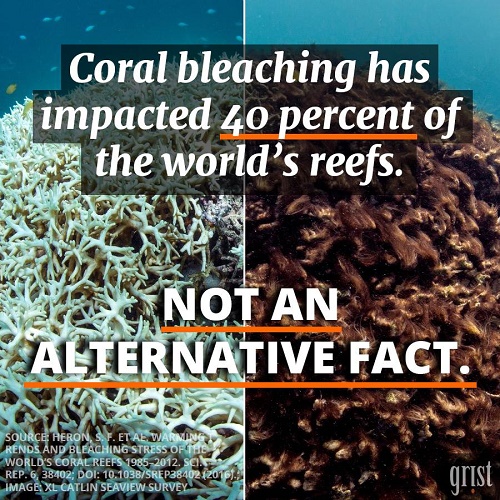
Climate Feedback asked its network of scientists to review the article, One of the most troubling ideas about climate change just found new evidence in its favor by Chris Mooney, Energy & Environment, Washington Post, Mar 27, 2017
Six scientists analyzed the article and estimated its overall scientific credibility to be ‘high’.
A majority of reviewers tagged the article as: Accurate, Insightful.
Click here to access the entire review.
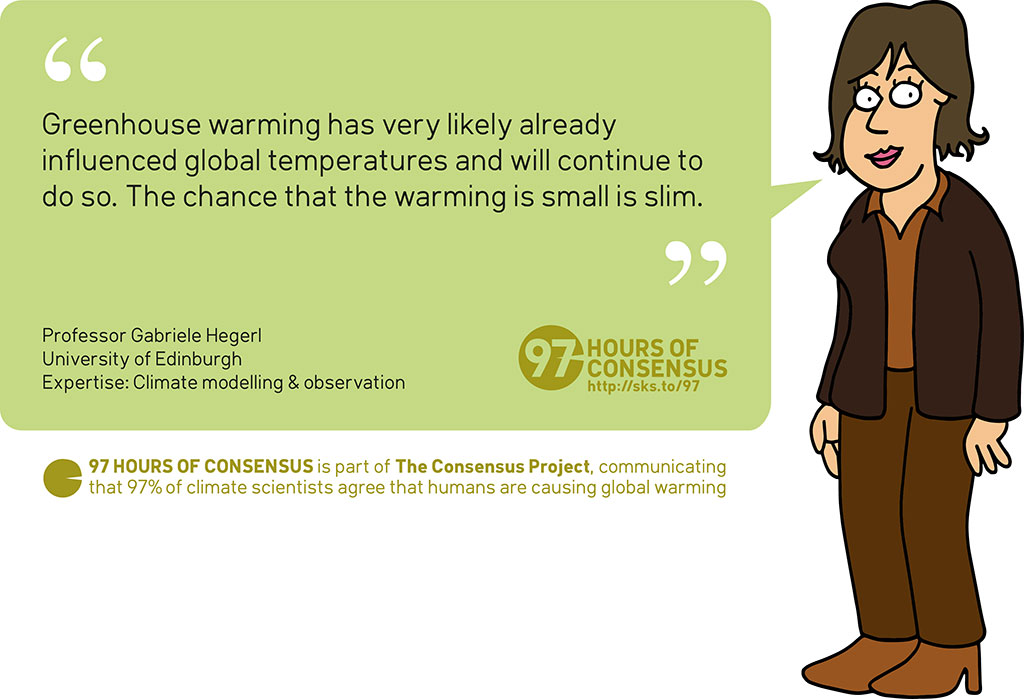
Quote derived with permission from author from:
Greenhouse warming has very likely already influenced global temperatures and will continue to do so. The chance that the warming is small is slim... Substantial impacts are expected.
High resolution JPEG (1024 pixels wide)
Posted by John Hartz on Sunday, 2 April, 2017
 |
The Skeptical Science website by Skeptical Science is licensed under a Creative Commons Attribution 3.0 Unported License. |